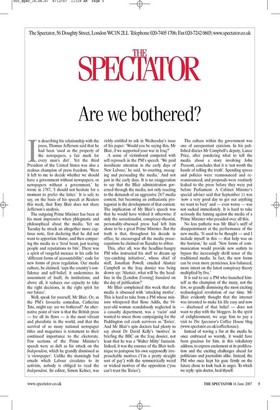Are we bothered?
1 n describing his relationship with the press, Thomas Jefferson said that he had been 'used as the property of the newspapers, a fair mark for every man's dirt'. Yet the third President of the United States was also a zealous champion of press freedom. 'Were it left to me to decide whether we should have a government without newspapers, or newspapers without a government,' he wrote in 1787, 'I should not hesitate for a moment to prefer the latter.' It is safe to say, on the basis of his speech at Reuters this week, that Tony Blair does not share Jefferson's analysis.
The outgoing Prime Minister has been at his most impressive when phlegmatic and philosophical about the media. Yet on Tuesday he struck an altogether more captious note, first declaring that he did not want to apportion blame, and then comparing the media to a 'feral beast, just tearing people and reputations to bits'. There was a spirit of vengeful menace in his calls for 'different forms of accountability': code for new forms of press regulation. Our media culture, he claimed, 'saps the country's confidence and self-belief; it undermines its assessment of itself, its institutions; and above all, it reduces our capacity to take the right decisions, in the right spirit for our future'.
Well, speak for yourself, Mr Blair. Or, as the PM's favourite comedian, Catherine Tate, might say: are we bothered? An alternative point of view is that the British press — for all its flaws — is the most vibrant and pluralistic in the world, and that the survival of so many national newspaper titles and magazines is testament to their continued importance to the electorate. Few sections of the Prime Minister's speech were as daft as his attack on the Independent, which he grandly dismissed as 'a viewspaper'. Unlike the stunningly bad emails which Labour circulates to its activists, nobody is obliged to read the Independent. Its editor, Simon Kelner, was richly entitled to ask in Wednesday's issue of his paper: 'Would you be saying this, Mr Blair, if we supported your war in Iraq?'
A sense of victimhood competed with self-reproach in the PM's speech. 'We paid inordinate attention in the early days of New Labour,' he said, 'to courting, assuaging and persuading the media.' And not just in the early days. It is no exaggeration to say that the Blair administration governed through the media, not only reacting to the demands of an aggressive 24/7 media context, but becoming an enthusiastic protagonist in the development of that context. The implication of Mr Blair's speech was that he would have wished it otherwise: if only the sensationalist, conspiracy-theorist, personality-obsessed press had left him alone to be a great Prime Minister. But the truth is that, throughout his decade in office, he encouraged all the media preoccupations he claimed on Tuesday to abhor.
This, after all, was the headline-hungry PM who instructed his staff to dream up 'eye-catching initiatives', whose chief of staff, Jonathan Powell, emailed Alastair Campbell as the Iraq dossier was being drawn up: 'Alastair, what will be the headline in the [London Evening] Standard on the day of publication?'
Mr Blair complained this week that the media is obsessed with 'attacking motive'. This is hard to take from a PM whose minions whispered that Rose Addis, the 94year-old woman scandalously neglected in a casualty department, was a 'racist' and wanted to smear those campaigning for the Paddington rail crash survivors as 'Tories'. And Mr Blair's spin doctors had plenty to say about Dr David Kelly's 'motives' in briefing the BBC on the Iraq dossier, not least that he was a 'Walter Mitty' fantasist. Indeed, it was the essence of the Blair technique to juxtapose his own supposedly irreproachable motives (I'm a pretty straight sort of guy') with the symmetrically weird or wicked motives of the opposition (you can't trust the Tories').
The culture within the government was one of unrepentant cynicism. In his published diaries Mr Campbell's deputy, Lance Price, after pondering what to tell the media about a story involving John Prescott, concludes that it is 'not worth the hassle of telling the truth'. Spending sprees and policies were reannounced and rereannounced, and proposals were routinely leaked to the press before they were put before Parliament. A Cabinet Minister's special adviser said that September 11 was 'now a very good day to get out anything we want to bury' and — even worse — was not sacked immediately. It is hard to take seriously the fuming against the media of a Prime Minister who presided over all this.
No less pathetic was Mr Blair's sniff of disappointment at the performance of the new media. 'It used to be thought — and I include myself in this — that help was on the horizon,' he said. 'New forms of communication would provide new outlets to bypass the increasingly shrill tenor of the traditional media. In fact, the new forms can be even more pernicious, less balanced, more intent on the latest conspiracy theory multiplied by five.'
It is sad to see a PM who launched himself as the champion of the many, not the few, so grandly dismissing the most exciting technological revolution of our time. Mr Blair evidently thought that the internet was invented to make his life easy and now — disabused of that belief — does not want to play with the bloggers. In the spirit of enlightenment, we urge him to pay a visit to The Spectator's Coffee House blog (www.spectator.co.uk/coffeehouse).
Instead of waving a fist at the media he once embraced so warmly, it would have been gracious for him, in this valedictory address, to express excitement at its proliferation and the exciting challenges ahead for politicians and journalists alike. Instead, the PM who once kept his gaze firmly on the future chose to look back in anger. To which we reply: spin doctor, heal thyself.




















































 Previous page
Previous page